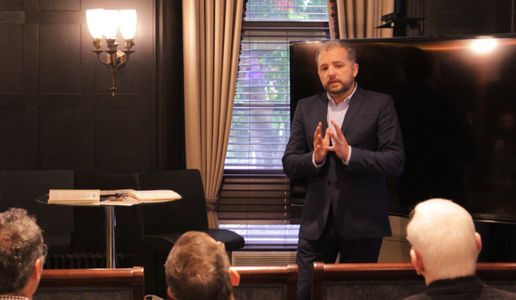Ban Publishes Op-Ed on Romania and Right-Wing Populism
Cornel Ban, Assistant Professor of International Relations and Co-Director of the Global Economic Governance Initiative, published a recent Op-Ed on why Romania is immune to illiberal populism and why the country was not engulfed by the region’s right-wing populist wave.
Ban’s Op-Ed, entitled “Romania and Right-Wing Populism: An Eastern European Outlier?” was published on December 12, 2016 in EU Visions.
From the text of the article:
Romanian citizens voted in parliamentary elections yesterday. The results are not what you would expect in Eastern Europe these days: with 46% of the seats in both chambers of Parliament, the Social-Democrats (PSD) left everyone else in the dust; the far right party is puny, largely unknown and failed to enter the Parliament.
That this country was not engulfed by the region’s right-wing populist wave may seem puzzling. This is a multiethnic country whose interwar nationalism and fascism were strong. Even its communism had a strong nationalist flavor and its early post-communist politics saw the rise of the strongest ultranationalist parties in the region. Romania is also one of Europe’s poorest countries, its banking sector and export industry are almost entirely foreign owned and where economic hardship sent close to a third of the labour force into emigration. Too many of its politicians, civil servants and business elite are corrupt, its population has one of the most conservative and authoritarian social values in Europe and, to top it off, Hungary’s Victor Orban unleashed new tension in bilateral relations. Local millionaires funded TV stations and parties peddling the standard rightwing populist fare. In brief, it should be the ideal playground of right populist parties. Several right-wing parties made a bid for entry into the Parliament using the rhetoric familiar with their peers elsewhere in the region. None broke through. There are several reasons for this.
The first reason is political history. In this country far-right political formations had been part of the government or ran large municipalities during early post-communism’s economic tragedy, before they could even begin to enter Parliament in other East-Central European countries. As such, to many voters, the populist right message is reminescent of the grim socio-economic failures and mismanagement of resources associated with that period. Sending rightwing populits to fix potholes can be a disaster for their political future.
You can read the entire article here.
The Op-Ed was also published by Open Democracy on December 13, 2016. You can read the entire Op-Ed here.
Cornel Ban is the author of ten peer-reviewed articles on economic policy strategies in Southern Europe, Eastern Europe and Latin America, professionals and economic policy, the politics of IMF fiscal policy advice and European financial crisis management. His most recent book was published by Oxford University Press and deals with the local adaptation and crisis resilience of global economic paradigms in Spain and Romania. You can read more about him here.
